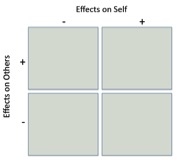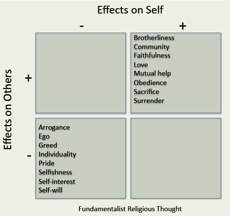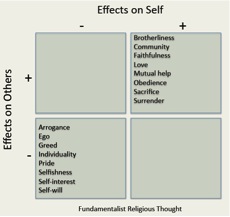
Years ago, I conducted an analysis of Ayn Rand's thought that can help explain why it exerts such influence over politicians such as Paul Ryan. I didn't start out studying Rand. I was exploring how people use words such as "selfish" and "altruistic," which refer to the effects of actions on self and others. Most people would define selfishness as benefiting oneself without regard to the welfare of others and altruism as benefitting others, often at the expense of oneself. To help categorize these and other words, I created a simple table with "effect on self" as the columns and "effect on others" as rows. 
Every time I encountered the use of a word referring to the effect of an act on self and others, I placed it in one of the four quadrants. Usually, it was easy to make a judgment call on the basis of the text containing the word. For example, in a letter that William James wrote to his mother asking for money, he expressed fear that she would regard him as selfish, meaning that he was trying to benefit himself at his family's expense. This particular usage of the word "selfish" would be placed in the right column (positive for self) and bottom row (negative for others).

In the real world, our actions can result in any of the four outcomes. There are win-win situations where everyone gains, lose-lose situations where everyone suffers, win-lose situations where I gain at the expense of others, and lose-win situations where I must sacrifice to benefit others. In a realistic description of the world, words referring to our actions would therefore be placed in all four quadrants. When I started to analyze some fundamentalist religious texts, however, a different picture emerged. All the words ended up in either the top right (win-win) or bottom left (lose-lose) quadrants, as shown for this example from an Anabaptist text written in the 17th century.
This gave me an insight into fundamentalist religions. It's not just that religious fundamentalists believe in God. They also believe in a world without tradeoffs. According to their beliefs, if they behave in a certain way, everyone will win. If they behave otherwise, everyone will lose. There are no messy tradeoffs where some win and others lose. Their world has been simplified to the point that their only choice is to head toward glory and away from ruin.
That's where Ayn Rand came into the picture. Her book of essays written with Nathanial Branden titled The Virtue of Selfishness caught my eye. Rand regarded herself as a serious philosopher in addition to a novelist and The Virtue of Selfishness outlined her doctrine of Objectivism. As I read through the essays categorizing words and phrases that referred to the effects of actions on self and others, another world without tradeoffs emerged. In Rand's world, the pursuit of self-interest was invariably good for everyone and the traditional virtues were disastrous for all. Rand also had a lexicon of words and phrases for stupid forms of selfishness (e.g., "blind desires," "hedonism," "irrational values") that were bad for both self and others. Not a single word or phrase ended up in the quadrants that reflect a tradeoff between the welfare of self and others. She even stated explicitly that "there are no conflicts of interest among rational men (p. 50)." 
In other words, Rand created a system of thought that is just like religious fundamentalism in portraying a world without tradeoffs. This begins to explain her enduring appeal. She offers a world that has been simplified to the point where the only choice is to head toward glory (the pursuit of self-interest) and away from ruin.
Nathaniel Branden, Rand's disciple who also became her lover and eventually left the faith, provides a vivid example of the spell that she was able to cast, as he described in his memoir Judgment Day. As a teenager growing up in a culture that emphasized conformity, he recalls that Rand's "constructions, images, rhythms, all took hold of me in some profound way." He read her novels repeatedly and described them as like a "shield" and "fortress" that allowed him to pursue his own goals. When he first met Rand, he described her writing as a "stylized universe," a phrase that delighted her. Here is how he describes Rand's inner circle: "This is how we were back then, Ayn and I and all of us -- detached from the world -- intoxicated by the sensation of flying through the sky in a vision of life that made ordinary existence unendurably dull." If that doesn't sound like a fundamentalist religious experience, what would?
The problem with visions of life that are detached from the world -- no matter how intoxicating -- is that they crash and burn when they encounter the real world. The real world includes win-lose and lose-win situations that must be managed, and pretending that they don't exist doesn't make them go away.
Paul Ryan's fascination with Ayn Rand sounds a lot like Nathaniel Branden's. The fact that he is also drawn to religious fundamentalism might seem like a contradiction, until we realize that both portray worlds without tradeoffs in which the only choice is to head toward glory and away from ruin. How simple. How compelling. How easy to communicate to others. And how disastrous for solving the problems of modern human existence.
This piece was originally posted at Evolution: This View of Life